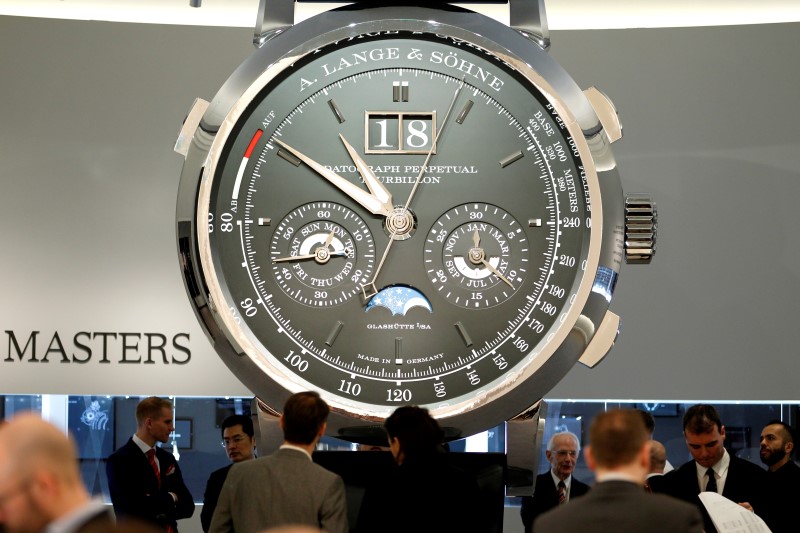By Astrid Wendlandt and Brenna Hughes Neghaiwi
PARIS/ZURICH (Reuters) - Luxury goods group Richemont (S:CFR) will no longer have a chief executive and be run by a group of senior figures once Richard Lepeu retires in March, Chairman Johann Rupert said on Friday as the group battles a severe watch industry downturn.
Shares in Richemont rose more than 8 percent after the group said October sales were "modestly positive," beating forecasts of a continued decline and echoing similar positive comments from luxury rivals.
It said trends improved in mainland China and Hong Kong but the owner of the Cartier brand and watch-makers Vacheron Constantin and IWC said it would not give further monthly trading updates in light of the market's increased volatility.
As Richemont needed to react quickly to challenges, the heads of Cartier and Van Cleef & Arpels would no longer have a direct boss and the group would be led by various executives with combined responsibilities.
"It is impossible to replace Richard (Lepeu) and appoint a new person who will take care of 35 direct reports," South African billionaire Rupert said in an analyst conference call.
"The board is really there to allocate capital and human resources, this is a more sensible and fairer structure."
Rupert, Richemont's controlling shareholder who has served in the past as CEO, said he would not become more involved in the day-to-day management of the group and preserve his role as "an air traffic controller of egos."
DIVERSITY CHALLENGE
The group appointed Georges Kern, currently CEO of IWC Schaffhausen, as head of watchmaking, marketing and digital. Jérôme Lambert, currently CEO of Montblanc, becomes head of operations responsible for central and regional services and all
sections other than jewellery and watchmaking.
Chief Financial Officer Gary Saage would also retire in July, replaced by deputy Burkhart Grund, while around a third of board members would step down and join a newly created International Advisory Council.
Rupert pointed to a generational change. Nearly all of Richemont's board members are over 50 and there is only one woman.
"I want to see less gray haired men and less gray haired Frenchmen, we have too few women and not enough diversity, not enough Asians or Americans," Rupert said, adding the possibility of his son joining the board "had not yet been discussed."
After more than two years of declining sales, Richemont has been buying back stock from retailers, particularly in hard-hit cities such as Hong Kong. The process was by now largely complete and Rupert said he was surprised rivals were not doing the same as "there was excess inventory for all watch products."
Richemont declined to give details about job cuts. It would tackle excess capacity and reduce headcount through natural attrition. It would also close underperforming shops, in second and third tier cities in China for example.
Saage said 25 shops were shut by the end of Sept. and another 25 would be closed by Dec.31.
"We have to slim down not only in production but throughout the group to make sure we don't have excess fat," Rupert said.
The shop closures and buyback led to a one-off charge of 249 million euros (£221.52 million).
Six-month sales fell 12 percent at constant exchange rates to 5.1 billion euros (£4.54 billion), while net profit dropped 51 percent to 540 million euros.
Excluding the charge, the profit decline would have been 25 percent. The company issued a profit warning in September.

Swiss watchmakers are grappling with weak demand for luxury timepieces as Chinese shoppers, their top customer, travel less to Europe for fear of attacks and, deterred by an anti-graft campaign, also buy fewer watches in Hong Kong and Macau.
(editing by)